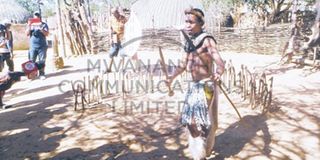TRAVEL : It was a memorable time in Zulu land

Scenery at the Zulu village where the filming was done. Photo | Elisha Mayallah
What you need to know:
- It is their attachment to the Zulu culture that distinguishes them from a number of other African cultural practices that are gradually giving way to western concepts. Zulus are courteous, friendly and hospitable people.
- According to our tour guide, Mr Thoko Jili, many tourists from across the world were drawn to this unique community, owing to their cultural heritage.
Zulu people are the trademark of a well-celebrated culture heritage and history in South Africa (SA). The popular ‘stomping of the feet’ during traditional dance performances as they sing with joy and patriotism, amazes the visitors watching the energetic and majestic movements of the entertaining dancers.
It is their attachment to the Zulu culture that distinguishes them from a number of other African cultural practices that are gradually giving way to western concepts. Zulus are courteous, friendly and hospitable people.
According to our tour guide, Mr Thoko Jili, many tourists from across the world were drawn to this unique community, owing to their cultural heritage.
Most influential monarch of Zulu nation
On this day we drove out of Durban early in the morning along the south coast heading north coast. The enchanting countryside on the north coast is scenic, unveiling itself away from tall buildings and towns. Along this route, you can sight infinite waving fields of sugar cane and patches of indigenous coastal forest, making the ride worth your while. In a distance, holiday villages perched along the edge of long sweeping bays opened up to unexplored lands of flora and fauna.
After an hour on the road, we made a stop at the King Shaka Visitors Centre at KwaDukuza town in KwaZulu Natal (KZN). KwaDukuza is a must visit place for curious visitors wanting to learn the insights of the traditions and customs of the proud Zulu nation. Known locally as a place for a lost person, KwaDukuza, formerly known as Stranger, is built on the original site of Shaka Zulu’s royal settlements, which was burnt after Shaka’s death.
At the visitors’ centre, Ms Gugu Ndlovu guided us on a tour to browse through the history life of the iconic Zulu King, Shaka. A collection of information is packaged in posters slicked on the walls and a ten-minute video clip that retells the history of the fallen legend, who wanted to control trade linked to the Durban port. KwaDukuza, the heartbeat of the north coast, now sits between two major ports, Durban and Richards Bay.
Shaka, a son of King Senzangakona, is regarded as a Zulu nation builder and unifier who died at the age of 48 and never officially married. He is believed to be one of the strongest and fiercest leaders in the history of Zulu nation. King Shaka became the undisputed ruler of this region after he brought much different chiefdom in northern KZN in the 1800s. The remarkable ability to forge a united realm from the warlike and diverse elements that made up the Zulu Kingdom is a singular triumph of King Shaka’s political skills.
The Shaka monument which is built within the courtyard of the visitors centre hosts thousands of locals every year on September 24 to celebrate Shaka’s anniversary. He was assassinated by his own brother on September 24, 1828. The Zulus honour the anniversary dubbed as ‘uMkhosi weLembe’ with colourful festivities on a day that is declared a public holiday in SA’s calendar.
The historical and entertaining Zulu village
We headed out on another 60 minute drive to the Zulu homestead of Shaka. Joe Gumbi, our local tour guide explained that the Zulu village was originally built as the film setting for the popular movie – Shaka Zulu – shot here in 1985. Joe continued saying that after the filming, it was decided to establish a museum that would keep the film message alive.
The sprawling village experience here is colourful with the Zulu culture expressed through traditional rituals, ceremonies, energetic tribal dancing and exquisite handcrafts. The Zulu village is also used to preserve the local culture and show it to the world.
We learnt array of Zulu customs such as how the locals attach great beliefs to stones, conduction of marriage ceremonies and dowry arrangements in the Zulu families and much more.
The replica of a Zulu kraal is on-site here comprised of a protection house and an enclosure for cows. We were told of the Zulu warriors and the traditional weapons; fortune tellers; shown how women engage in handicrafts such as weaving baskets, beadwork and pottery; men working on skins and traditional healers (locally known as Sangoma), are part of a Zulu village. Some of us sampled the local beer.
We were then invited to a local lunch menu at a restaurant within the village. The set up for lunch was a buffet and the choice was grand. I could tell a few similarities such as boiled maize and beans (Phutu), mixed vegetables (Isitambu), corn (Ummbila), spinach (imifino) and sweet potatoes (Ubhatata). This part of SA is bound to keep drawing visitors for many years to come.




